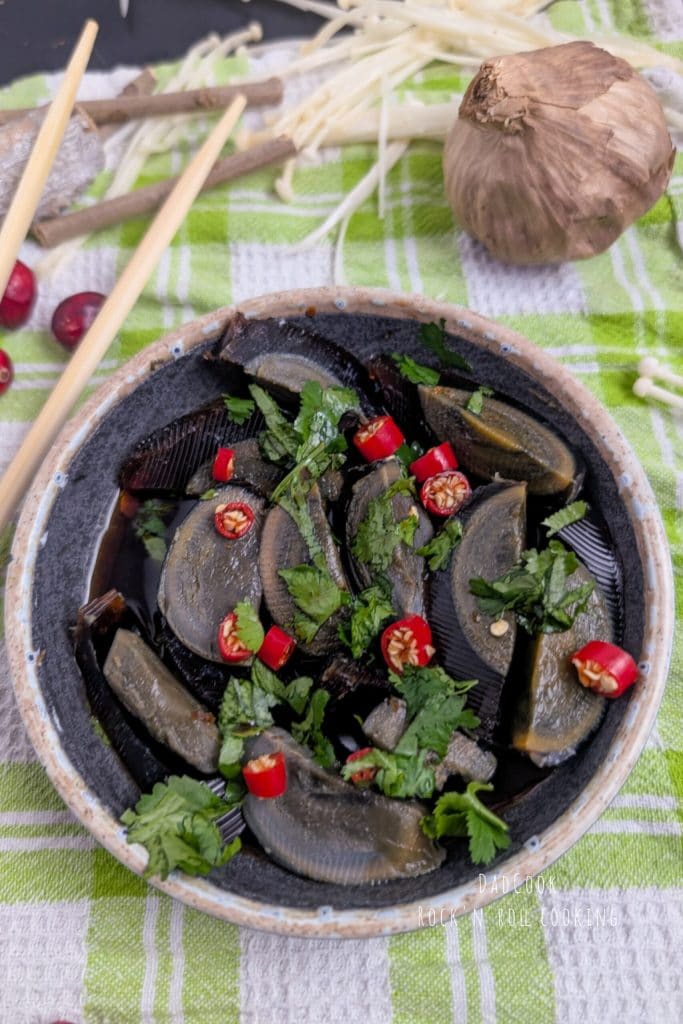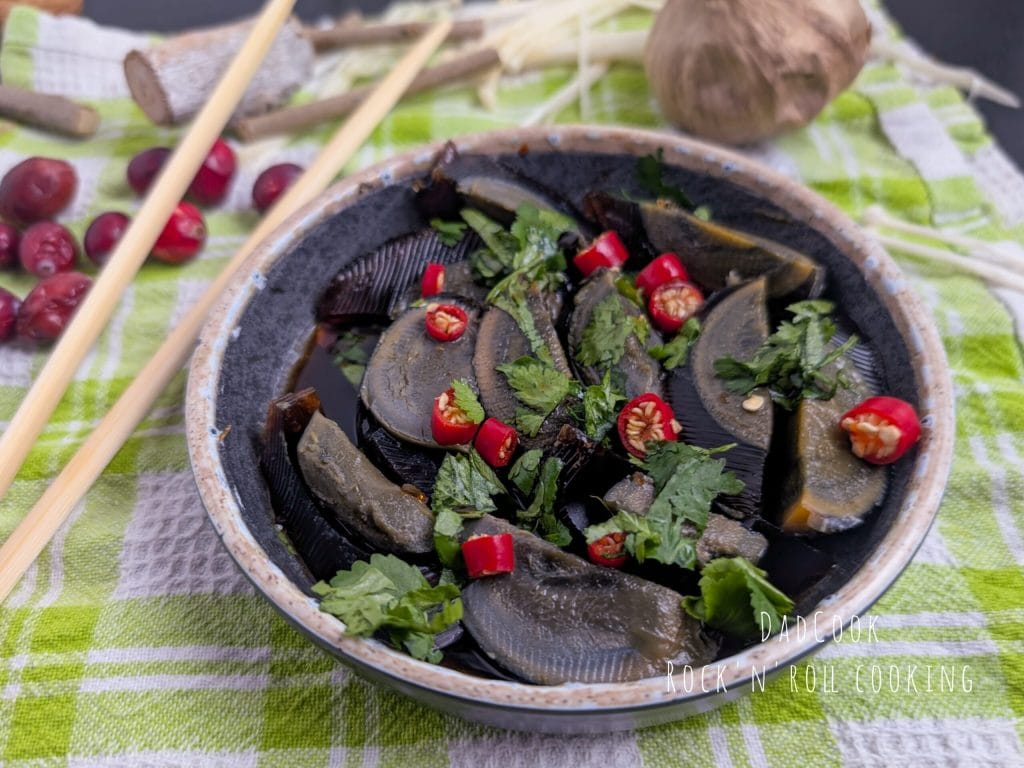The century egg. A name that evokes mystery, perhaps a hint of fear, but above all a deep curiosity. Don’t be deceived by its unusual appearance and enigmatic name: this ancient Chinese dish is a true culinary journey into the heart of a millenary tradition.
Born almost by chance, according to legend, from the discovery of eggs preserved in quicklime during the Ming dynasty, the century egg is the result of a fermentation process that lasts several weeks, if not months.
Immersed in a mixture of clay, ash, salt, lime, and rice hulls, the eggs undergo a surprising transformation: the yolk takes on a dark green, almost black color, with a creamy texture, while the white becomes amber and gelatinous, with an unexpectedly delicate flavor.
But why eat a “fermented” egg?
In Chinese culture, the century egg is considered a delicacy, appreciated for its unique and complex taste, rich in umami. Additionally, it is believed to have health benefits, such as the ability to cool the body and improve digestion.
Prepare to abandon prejudices and dive into a unique sensory experience, discovering flavors and textures that will take you straight into the heart of Chinese gastronomy.

- Difficulty: Very Easy
- Cost: Economical
- Rest time: 10 Minutes
- Preparation time: 10 Minutes
- Portions: 4
- Cooking methods: No Cooking
- Cuisine: Chinese
- Seasonality: New Year's Eve, New Year's Day
Ingredients
- 4 Century Eggs ((Duck))
- 1 bunch cilantro
- 2 hot chili peppers
- to taste soy sauce
Tools
- 1 Cutting Board
Steps
Before you begin, get some century eggs. You can find them in specialized Asian grocery stores, some well-stocked supermarkets, or online. Make sure to choose eggs with intact shells without cracks. Once you have your century eggs, it’s time to prepare them. Peel them gently, just as you would a hard-boiled egg. You will notice immediately that the shell comes off easily, revealing the dark, gelatinous white. Rinse the eggs under running water to remove any clay or ash residues. Now, with a sharp knife, cut each egg into wedges, as if you were slicing a cake. This will make it easier to serve and enjoy them.

Now that the century eggs are ready, it is time to assemble the plates. Take 4 small plates and distribute the egg wedges evenly. Add a touch of freshness and color with chopped fresh cilantro. Sprinkle with finely chopped hot chili pepper – its pungent flavor pairs perfectly with the intense and particular taste of the century egg. Finally, drizzle with a splash of soy sauce, which will further enhance the flavors of this Chinese delicacy. Let the eggs marinate for about ten minutes before serving. This allows the flavors to blend perfectly, creating a truly unique harmony of taste. And to make the dish even more inviting, you can garnish it with a few cilantro leaves.

After the ten minutes of marinating, the century eggs are ready to be savored! Serve them as a delicious appetizer or as part of a more elaborate dish. For an authentic experience, use Chinese chopsticks to savor each wedge. The gelatinous consistency of the white and the creaminess of the yolk go perfectly with the fresh flavor of cilantro, the spicy touch of chili pepper, and the saltiness of soy sauce. The century egg is an explosion of flavors and textures that will captivate you at the first taste. Enjoy! 🥢

Here are some storage tips for the century egg and some variations to make your recipe even more interesting:
Storage:
In the fridge:
The century egg can be stored in the refrigerator for several weeks, or even months, if the shell is intact. Once peeled, it is best consumed within a few days.
Yolk Storage:
If you have leftover yolks, you can store them in an airtight container covered with a drizzle of oil. This way, they will keep for a few days in the fridge. *
Do not freeze:
The century egg does not freeze well, as the texture of the white and yolk would suffer.
Variations:
Century Egg with Ginger:
A classic Chinese pairing involves serving the century egg with thin slices of fresh marinated ginger. The ginger adds a spicy and refreshing note that balances the intense flavor of the egg.
Tofu and Century Egg Salad:
Crumble the century egg and add it to a salad of fresh tofu, dressed with soy sauce, sesame oil, and rice vinegar.
A light and flavorful dish, perfect for a summer lunch.
Congee with Century Egg: Congee is a sort of rice porridge typical of Chinese cuisine.
Adding the century egg to congee is a way to enrich this simple dish with an extra touch of flavor.
Fried Century Egg:
For a more indulgent variation, you can slice the century egg and fry it in a pan with a splash of oil. Frying will make the white crispy and the yolk even creamier.
Extra Tips:
Experiment with different varieties of chili peppers to find the one you prefer.
If you don’t like cilantro, you can replace it with parsley or chives.
For a more elegant presentation, serve the century egg on a bed of mixed salad.
I hope these tips and variations are helpful for you to experiment and enjoy the century egg to the fullest!
Wine Pairing with the Century Egg:
The century egg, with its complex flavor and particular texture, can also offer interesting opportunities for pairing with red wines.
To accompany the century egg, the ideal choice is aromatic white wines like Gewürztraminer or Riesling, capable of balancing the intense and slightly sulfurous flavor with their fruity and spicy notes.
Alternatively, a dry rosé with good acidity, such as a Cerasuolo d’Abruzzo, can be an excellent solution to cleanse the palate.
If you prefer a red, you can opt for a young Pinot Noir, served slightly chilled, which with its delicacy and earthy notes will not overshadow the taste of the egg.
For those who love more structured wines, a Beaujolais Villages with its freshness and fruity aromas can be an interesting and unexpected pairing.
FAQ (Questions and Answers)
What exactly is a century egg?
The century egg, also called “pidan” in Chinese, is a traditional Chinese food obtained through a preservation process that involves fermenting eggs (usually duck, but also chicken or quail) in a mixture of clay, ash, salt, lime, and rice hulls for several weeks or months. This process gives the egg a unique appearance and flavor.
Why is it called “century egg” if it is not preserved for 100 years?
The name “century egg” likely derives from the fact that the preservation process can last long, though not an entire century. Additionally, the dark and “ancient” appearance of the egg may have contributed to this evocative name.
What does the century egg taste like?
The taste of the century egg is complex and difficult to describe. The egg white has a gelatinous consistency and a slightly salty taste, while the yolk is creamy and features intense umami notes, with hints of aged cheese and a slightly sulfurous aftertaste.
How do you eat a century egg?
The century egg can be eaten on its own as an appetizer or used in various recipes. It is often enjoyed cut into wedges, seasoned with soy sauce, ginger, vinegar, or chili. It can be added to salads, soups, congee (rice porridge), or noodle dishes.
Is the century egg harmful?
If produced correctly, the century egg is safe to eat. However, it is important to purchase it from reliable sources and check the integrity of the shell. Excessive consumption of century eggs is not recommended due to the high sodium content.
Are there any contraindications for eating a century egg?
Generally, the century egg is well-tolerated. However, some people may be sensitive to its taste or texture. Additionally, it is not recommended for people with hypertension or kidney problems due to the high sodium content.
Is the century egg made from chicken or duck eggs?
Traditionally, the century egg is made with duck eggs, although chicken or quail eggs are sometimes used. Duck eggs are preferred for their larger size and more durable shell, which better withstands the preservation process.

